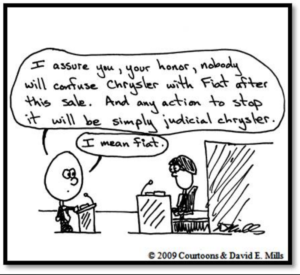ContentCoup.com
October 30, 2018

Pro se litigants, also known as SRLs (self-represented litigants) to legal types, are increasing in frequency every year. There aren’t a lot of recent, concrete data showing the exact percentage of cases involving pro se litigants in U.S. courts. But the numbers are quite high based on past research and the “justice system” remaining consistent in its customs and traditions for many generations.
A 2005 report on New Hampshire courts found that 70% of family law cases in state superior court had at least one pro se party. California reported 67% of family court cases had a pro se litigant in 2004. Counsel repesents landlords 90% of the time. Tenants represent themselves 90% of the time. A 2015 study by Jessica Steinberg of George Washington University Law School, estimated that upwards of 90% of civil cases nationwide include pro se litigants.
A 2013 report by the State Justice Institute (SJI), a government agency ran by Presidential appointees, recommended a minimum national standard that mandates state court systems keep concrete, annual statistics on cases involving pro se litigants. These reports should, among other things, provide insights as to pro se litigant case types, event types, and other data points.
While 87% of case management systems (CMS) in U.S. court jurisdictions have the ability to keep such statistics, most simply do not. The SJI report indicates that 41% of jurisdictions only run reports on an “ad hoc” basis, not regularly. Further, only 18% of jurisdictions said reports “can [could]” be run regularly. But administrators, again, choose not to do so. The definition of “SRL” is inconsistent, further complicating the data collection process.
The Courts’ Opinions on Self-Representation

The Sixth Amendment of the U.S. Constitution, made applicable to the states by the Fourteenth Amendment, guarantees the right of the accused to receive “Assistance of counsel.” The U.S. Supreme Court affirmed in Gideon vs. Wainwright, 372 U.S. 335 (1963), that the Fourteenth Amendment required states to provide counsel to indigent defendants accused of felony crimes. The Court further clarified the Sixth Amendment in 1975 when it ruled that the right to self-representation is also guaranteed when the litigant “intelligently and voluntarily” requests to do so.
The Sixth Amendment further guarantees the right to effective counsel in all situations, even for convicted killers. David Washington received a death sentence in Florida. He pleaded guilty to murders committed in 1976. The legislative history of this case formed what is now the standard for “effective counsel.”
Washington sought relief in post-conviction proceedings. He claimed ineffective assistance of counsel. The defense failed to call character witnesses. Counsel also failed to request psychiatric reports and other items that could have been considered mitigating circumstances. The trial court denied relief and the Florida Supreme Court affirmed the death sentence.
Strickland v. Washington chronology
Washington next sought relief from the U.S. District Court of Florida via habeas corpus. Note this case occurred in the late 1970s and early 1980, well before the one-year statute of limitation for federal habeas was implemented via the Anti-Terrorism and Effective Death Penalty Act (AEDPA) of 1994. Washington again claimed that ineffective assistance of counsel led to the death sentence. The District Court denied relief, ruling that counsel may have “erred” in judgment, but the conduct did not prejudice Washington.
 The habeas case got interesting on review. A three-judge panel at the Fifth Circuit of Appeals rendered a mixed decision in 1981. It remanded the case back to the District Court with instructions on how to determine “ineffectiveness” of counsel. But the decision came at a time in U.S. history when the Fifth Circuit was partitioned into two courts.
The habeas case got interesting on review. A three-judge panel at the Fifth Circuit of Appeals rendered a mixed decision in 1981. It remanded the case back to the District Court with instructions on how to determine “ineffectiveness” of counsel. But the decision came at a time in U.S. history when the Fifth Circuit was partitioned into two courts.
The Eleventh Circuit Court of Appeals was officially established and opened for business in October 1981. The new court now had jurisdiction over Alabama, Florida, and Georgia District Courts, while the Fifth Circuit maintained jurisdiction over Louisiana, Mississippi, Texas, and the Panama Canal Zone. The latter was ceded to the Panamanian government in 1982.
RELATED: The Legislative History of the Creation of the Eleventh Circuit Court of Appeals (via Florida International University Law School).
The first case to reach the new Eleventh Circuit was Bonner v. City of Prichard, 661 F.2d 1206, 1209 (11th Cir.1981). The court ruled that all “old Fifth Circuit” decisions are binding precedent for the new Eleventh Circuit. But the court decided to rehear Washington’s appeal en banc. The Court created its own test to determine attorney effectiveness, and remanded the case back to the Florida District Court with new instructions.
The State of Florida appealed to the U.S. Supreme Court, which ultimately reversed the Eleventh Circuit’s decision and created its own two-part test to determine ineffective assistance of counsel in Strickland vs. Washington:
1. Defendant must prove that counsel’s performance was so “deficient,” that counsel was “not functioning” as a lawyer guaranteed by the Sixth Amendment; and
2. The bad performance prejudiced the Defendant and denied them a fair trial.
In short, public defenders unwittingly forced into people’s lives and/or paid attorneys who charge $10,000 retainer fees for representation, must, by law, represent you in an objectively-diligent fashion. But many public defenders across the country are tasked with thousands of cases at once and want to get through them as quickly and with the least amount of effort as possible. Paid attorneys are simply inaccessible to most Americans.

Data from the National Center for Access to Justice (NCAJ) says there are about 0.64 civil attorneys for every 10,000 persons who cannot afford lawyers in the USA. Some attorneys charge $200 just for an initial consultation, then five-figure retainer fees. Attorneys that charge $100 per hour in small towns are considered “cheap.” But that number is rare and unrealistic in medium and large cities.
Self-representation is usually done out of necessity (lack of money). The odds are heavily stacked against litigants who take the self-representation path. But those who follow these five tips will at least put themselves in the best position for justice.
Play Offense, Not Defense when self-represented
Justice Richard Posner, of the Seventh Circuit Court of Appeals, wrote a dissenting opinion in the case of Merritt vs. Faulkner, 697 F.2d 761 (7th Cir. 1987). He said, “It is unfair to deny a litigant a lawyer and then trip him up on technicalities.” The Ninth Circuit Court of Appeals has ruled that “In civil rights cases where the plaintiff appears pro se, the court must construe the pleadings liberally and must afford plaintiff the benefit of any doubt.” Jackson v. Carey, 353 F.3d 750, 757 (9th Cir. 2003).
Self-represented litigants must not get into reactive patterns and allow their adversaries to dictate the pace and flow of legal proceedings. You may not know exactly what a motion in limine is or know how to file a petition for special action in an appeals court. But do your best to draft and file them when necessary as, again, the courts are supposed to give you the benefit of the doubt.
Whether its a wrongful termination, alimony, or breach of contract case, its essential to stay on track. Don’t be afraid to ask the judge via motion for extensions of time for filing briefs if you’re behind on your research. Missed deadlines derail the entire case. Opposing counsel knows the self-represented are vulnerable due to lack of money and legal knowledge. They will exploit these realities because their goal is to win as well. The aggressor, however, typically comes out on top in court battles. Keep that in mind throughout.
Do your research and double-check it
Legal research is boring, tedious, and seemingly endless. It also requires reading through and translating a bunch of lawyer and judge mumbo-jumbo to determine what exactly you need to do next.

When all else fails, always default to the Rules of Civil or Criminal Procedure for the respective court. Judges instantly dismiss pro se litigants as nuisances and start viewing their briefs as frivolous if said briefs appear hastily constructed, overly emotional, and nonsensical. If you truly want to win your case, consider hiring a legal writer or paralegal to research and write your briefs. It costs a fraction of what lawyers charge, and provides you a teammate in a difficult game.
Don’t let all your hard work and research go to waste due to a preventable legal technicality.
Self Representation and Overconfidence
Its a great feeling when a self-represented litigant gets past the demurrer stage of their civil case and the judge advances it to the discovery stage. Celebrate the victory because you’ve effectively convinced a judge that your case is not entirely frivolous. But now the real work begins.
It’s time to re-read procedures, learn discovery rules, and determine how you’re going to handle depositions. Court reporters cost money and you’re going to need them for depositions and appearances. Some expert witnesses may testify for free if you’re case is compelling and well-though-out. Exercise due diligence. No matter what, you are the underdog and must embrace that role to the end.
Seek outside help when necessary. Most federal and state courts have self-help documents and people readily available. You’re not a law expert. Thorough preparation is key to potential success.
Don’t Mention Settlements; Let Them Do That
The moment you start talking about settling out of court, your opponent knows you want to get the proceedings over with quickly, without much work. Its true that 95% of civil lawsuits end in pre-trial settlements or dismissals; and around 94% of felony convictions are the result of plea bargains (settlements), not jury trials. But that doesn’t mean cases immediately arrive at that point.
State governments, federal government, and private attorneys know that trials are expensive and time-consuming. They almost always want to settle and end the case quickly and cheaply. Many litigants are now forced into arbitration and not even allowed to put their cases in front of a judge and jury without jumping through a lot of hoops. Everyone involved in court cases want quick dispositions. But you cannot blink first because it reveals your hand.
Once the opponent commences settlement talks and makes an offer, always counter with something heavily in your favor. The final settlement is always something in between.
Self-representation mean checking and double-checking everything
This is a rule of thumb for professional writers. Its extremely difficult to edit your own work effectively because you created it. Its always best to have another set of eyes look it over.
Whether its your husband, wife, or 18-year-old daughter, have them read over your self-written briefs before filing. Make sure they understand what you have written. If a layperson cannot understand it, a judge is unlikely to understand it. Judges decide quickly if actions are legitimate or frivolous. Make certain it’s clear, chronological, and concise.
Self representation requires courage and maximum effort. Leave no stone unturned in your journey towards justice. Good luck!
Content Coup offers personalized legal research and document preparation to assist litigants with self-representation. We’ll help you navigate your case through the court system and give you the best chance to win at a fraction of the cost of an attorney. Contact us today with details about your case, and our legal writer will get back to you in 24 hours.